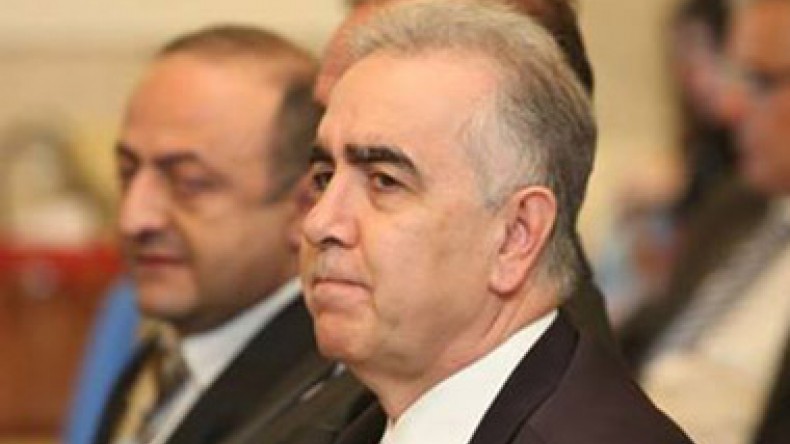
Hastert should also be investigated on Turkish bribery accusations
By Harut Sassounian
Publisher, The California Courier
TheCaliforiaCourier.com
Federal prosecutors indicted last week former U.S. House Speaker Dennis Hastert for:
1) Lying to the FBI on why he had withdrawn nearly $1.7 million from various banks in the last four years,
2) Evading the reporting requirements of banks for large cash transactions.
Each count carries a maximum penalty of five-years in prison and a $250,000 fine.
The indictment charges that in 2010 Hastert secretly met one of his former students and agreed to pay him $3.5 million to secure his silence for “past misconduct”, when he was a wrestling coach at the Yorkville High School in Illinois from 1965 to 1981. Since that meeting, Hastert, 73, paid him $1.7 million by withdrawing initially $50,000 at a time from several banks, and after being questioned by bank officials, he reduced each withdrawal to just under $10,000, to evade the banks’ reporting requirements.
In December 2014, when asked by the FBI as to why he had made such large cash withdrawals, Hastert made “materially false, fictitious and fraudulent statements,” the federal prosecutors said. Hastert was making these payments to his former student to conceal sexually abusing him decades ago, according to various news reports.
Hastert’s indictment is of particular interest to the Armenian-American community because of past accusations that he received large bribes from Turkish entities to quash pending Armenian Genocide resolutions, while serving as Speaker of the House of Representatives from 1999 to 2007. These claims were never fully investigated by the U.S. government. After retiring from Congress, Hastert worked for Dickstein Shapiro in Washington, D.C., as a lobbyist for Turkey and other clients.
Ironically, at the start of his political career, Cong. Hastert strongly supported recognition of the Armenian Genocide. He spoke on the House floor on April 19, 1984, in favor of a congressional resolution acknowledging the Genocide. On June 5, 1996, he voted for an amendment to cut U.S. aid to Turkey until that country recognized the Armenian Genocide. Furthermore, in August 2000, Speaker Hastert met with Armenian community leaders in Glendale, pledging to bring the pending Armenian Genocide resolution to a vote, despite Pres. Clinton’s vehement objections.
However, moments before the genocide resolution was to be voted upon on October 19, 2000, Speaker Hastert yanked the bill from consideration, using the excuse that Pres. Clinton had sent him a letter raising “grave national security concerns.” How is it that the Republican House Speaker, who fiercely opposed a Democrat President on almost every issue and supported his impeachment, suddenly decides to agree with him on rejecting the Armenian Genocide resolution? Four days later, the Turkish Sabah newspaper reported that Hastert had agreed to block the resolution on condition that Pres. Clinton made such a request in writing.
Could there have been a sinister reason why Speaker Hastert had a sudden change of heart on the Armenian Genocide issue?
Vanity Fair magazine revealed in its September 2005 issue that former FBI translator Sibel Edmonds had reviewed wiretaps of Turkish phone calls claiming that Speaker Hastert’s price to withdraw the Armenian Genocide resolution would be at least $500,000. The FBI overheard Turkish speakers boasting that they have “arranged for tens of thousands of dollars to be paid to Hastert’s campaign funds in small checks” because contributions less than $200 do not have to be itemized in public filings. In fact, Vanity Fair’s examination of Speaker Hastert’s federal filings from 1996 to 2002 showed that his campaign had received close to $500,000 in unitemized payments.
Shockingly, rather than investigating Edmonds’ credible accusations, the FBI fired her, and the US government did not allow her to testify in Congress or in court, using the “state-secrets privilege” as a cover.
Not surprisingly, Speaker Hastert’s visits to Turkey in 2002 and 2004 were funded by the Turkish-US Business Council. Consequently , in July 2004, Hastert issued a blunt statement vowing to block all future Armenian Genocide resolutions — a pledge he kept until his departure from the House in November 2007!
Interestingly, Hastert’s personal wealth went from $270,000 to up to $17 million during his two decades of service in Congress, at a time when his congressional salary was $175,000 a year! Where did his millions come from?
Six months after leaving the House, Hastert began to reap the benefits of serving Turkish interests in Congress by joining the firm Dickstein Shapiro as a lobbyist representing the Turkish government, among other clients. He worked jointly with former House Majority Leader Dick Gephardt, sometimes traveling together to Turkey, and splitting millions of dollars in lucrative lobbying fees. Last week, immediately after the federal indictment was issued, Hastert resigned from the lobbying firm.
A full investigation should now be conducted of all allegations against Hastert that have been ignored for far too long. The American public needs to know if he were being bribed, or even worse, blackmailed, by Turkish entities during his tenure as Speaker, the third most powerful office in Washington after the President and Vice President!
Newsfeed
Videos






























